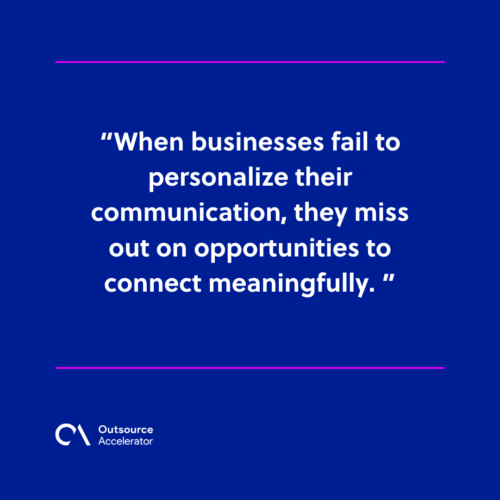How AI for customer engagement drives improved customer experiences

Artificial intelligence is rapidly transforming industries across the globe, from healthcare to finance, and retail.
Its ability to analyze vast amounts of data and automate complex tasks helps businesses streamline operations, boost productivity, and offer more personalized experiences.
In customer service, AI has become a game-changer, providing companies with tools to improve response times, enhance efficiency, and offer 24/7 support.
One area where artificial intelligence is truly making a difference is in customer engagement, where it helps brands foster stronger, more meaningful connections.
In this article, we’ll explore how AI for customer engagement works and how it can contribute to business growth by improving customer interactions and driving satisfaction.
5 Common pitfalls to effective customer engagement
Many companies often fall into common pitfalls that hinder their ability to truly connect with customers:
1. Lack of personalization
Customers expect more than generic responses. When businesses fail to personalize their communication, they miss out on opportunities to connect meaningfully.
In fact, New Epsilon’s survey revealed that 80% of customers are more likely to purchase from a company that offers personalized experiences. Without tailoring messages to customer needs, businesses risk losing customer loyalty.

2. Ignoring customer feedback
Failing to listen to and act on customer feedback is a major pitfall. When customers feel their opinions aren’t valued, they may turn to competitors.
Companies that regularly collect and act on feedback build trust and improve their services, leading to better customer retention.
3. Inconsistent communication
Whether it’s through email, social media, or phone support, inconsistency in communication can confuse customers and damage trust. Customers expect seamless interactions across all channels.
4. Overcomplicating processes
Customers value efficiency. Long wait times, complicated forms, or excessive steps to resolve issues can lead to frustration. A study by Zendesk found that 73% of customers say they stop engaging with a brand after a poor service experience.
5. Focusing solely on sales
While making a sale is important, focusing only on pushing products can make customers feel like they’re being treated as transactions rather than as valued individuals.
A successful engagement strategy involves building relationships that go beyond sales, addressing customer needs, and providing value.
5 Uses of AI for customer engagement
Artificial intelligence has become instrumental in modern customer engagement. Businesses create more personalized, efficient, and responsive interactions with their customers.
Here are several ways AI for customer engagement is being used:
1. Chatbots for instant support
AI-powered chatbots are widely used to handle basic customer inquiries, providing immediate assistance 24/7.
They can:
- Answer frequently asked questions
- Offer product recommendations
- Help customers with simple troubleshooting
Chatbots reduce wait times and improve customer satisfaction by offering instant solutions.
2. Personalized recommendations
AI can analyze a customer’s browsing history, preferences, and previous interactions to provide tailored product or content recommendations.
A personal approach increases the likelihood of cross-selling and upselling opportunities, ultimately boosting sales and enhancing customer engagement.
3. Predictive analytics
This technology can anticipate customer needs by analyzing behavior patterns and historical data.
AI’s predictive ability allows firms to offer proactive support . For example, it’s able to remind customers of upcoming renewals or suggest products they might need before they ask.
This leads to more efficient interactions and strengthens customer loyalty.
4. Sentiment analysis
AI tools can also analyze customer feedback, social media posts, and reviews to gauge customer sentiment. This helps brands understand how customers feel about their products or services and identify areas for improvement.
Companies can engage customers in a more meaningful way as they act on these insights.
5. Voice assistants
AI-driven voice assistants, like Siri or Alexa, can provide hands-free customer engagement.
Many companies integrate voice technology into their support systems. Customers are able to interact with brands through voice commands for tasks like order tracking or finding product information.

AI for customer engagement FAQs
As this technology continues to evolve, many businesses have common questions about its implementation and benefits.
Outlined below are some of the frequently asked questions about AI for customer engagement:
1. What is AI for customer engagement?
AI for customer engagement involves using artificial intelligence tools, like chatbots, recommendation systems, and predictive analytics, to enhance interactions with customers.
It helps businesses provide faster responses, personalized experiences, and proactive service.
2. How does AI improve customer experience?
AI improves the customer experience by offering quick, relevant responses and solutions tailored to individual needs. It can also predict customer behavior and preferences, making interactions more intuitive and reducing friction.
3. Can AI replace human agents?
While AI can handle routine tasks and queries, human agents are still necessary for complex or sensitive issues. AI is best used as a supplement, assisting agents and improving overall efficiency.
4. Is AI expensive to implement?
The cost of AI varies depending on the tools and scale of implementation. However, many businesses find that the long-term benefits—such as improved customer satisfaction and increased sales—outweigh the initial investment.
In conclusion, AI for customer engagement can significantly improve how organizations connect with customers, making interactions smoother, more personalized, and more efficient.







 Independent
Independent




